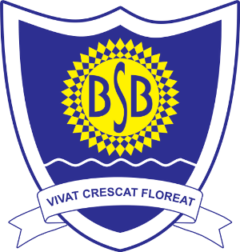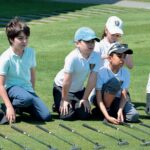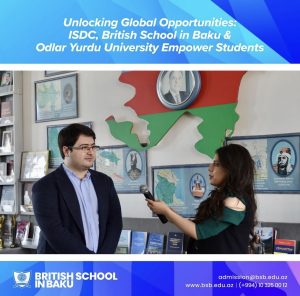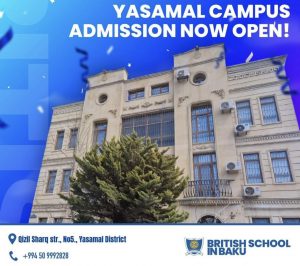British School in Baku offers great opportunities for admission to the best universities in the world
Experts raise the alarm that it is urgently necessary to adjust the education system to the new conditions in the swiftly changing world. In the UK, which is known to provide the best education opportunities in the world, the process of adaptation has started long ago.
The British School has operated in Baku for 14 years. It’s proved its ability to be one of the best private educational institutions in Azerbaijan. But can it keep up with the current changes in the global education system? We asked this and other questions to the Chairman of the Board of Governors of the British School in Baku, Samir VELIYEV.
“To what extent is the curriculum of the British School in Baku in line with the curriculum in the United Kingdom?”
“The British School in Baku (BSB) was established in 2007 and became one of the first international schools to focus entirely on the implementation of the British education system in Azerbaijan. In fact, we have become pioneers in this direction.
“Back in the day, we invited qualified specialists from the United Kingdom to implement the idea. They have had extensive experience in the creation of such schools abroad. Then we applied to the international association COBIS (Council of British International Schools), which accredits British schools abroad. In general, the management of our school is entrusted to highly qualified British specialists.
“We also invited very good teachers from Germany and France. As a result, we have managed to create a school that was completely identical to its British counterparts, which is also confirmed by the certificate we received from COBIS after a rather complicated multi-stage accreditation process and repeated inspections over several years. Today we have 500 students, 150 teachers, of which 26 are foreign specialists. Our curriculum fully complies with the British standards.”
“Can your graduates be easily admitted to the British universities?”
“Not only British universities. Our school also has a license from the Ministry of Education of Azerbaijan to conduct educational activities. Our curriculum contains subjects covering the study of the Azerbaijani language, history, geography, and the constitution. As a result, our graduates receive several documents on the completion of secondary education – an Azerbaijani certificate, IGCSE (International General Certificate of Secondary Education) and A-Level – a certificate of complete secondary education in Great Britain.
“Moreover, given the increasing interest of Azerbaijani graduates in universities in Turkey over the past couple of years, we began to offer the SAT (Scholastic Aptitude Test) training courses for preparing and passing standardised tests for admission to Turkish universities. We also offer the IELTS (International English Language Testing System) courses for passing the international exam in English. All these courses are part of our training program and each student, upon graduation, is fully prepared to continue education both in Azerbaijan and in any other country.
“Moreover, last year we included in our curriculum a rather prestigious program – NCUK (The Northern Consortium UK), which unites about 30 universities. This pre-university program is designed for the last year of school and is offered to graduates choosing one of the consortium universities to continue their studies. This is the most profitable way for them to get directly to the desired university.”
“Do teachers take part in choosing a profession and determining the talents of students?”
“Of course, they do. We also have designated circles/clubs to develop the talents of students in various fields of science, art, sports, IT, etc. Occasionally, parents want to see their children focused on a certain area, but in the process of education and in these clubs, we can identify different talents of these children. We’re happy that parents trust our opinion, listen to us, which ultimately has a beneficial effect on the child’s future. In addition, we encourage the participation of our students in international Olympiads, including in sports and art. We encourage them to be the winners of such events.
“Every year our graduates become students of universities with even better ratings than before. Now we have them in Oxford, Cambridge, London School of Economics, etc. It’s not a secret how difficult the selection process in these higher education institutions. Beyond British universities, quite a few of our graduates have ended up in the most prestigious universities in other countries of Europe, Canada, and the US.
“Our graduates do not forget about the school. They periodically meet with current students, which is a huge incentive for the latter. We have the Alumni Club, which already has many names known to our society. They still remember with gratitude the work of our teachers.”
“There’s been a lot of speculation about the uselessness of many professions simply because they’ll not be in demand in a few years. Are there any changes in the British education system in this regard?”
“Over the past five years, the British secondary school curriculum, which we have to follow in our school, has completely changed three times, including the textbooks, materials, as well as the vision and methodology in general.
“Yes, today’s world is changing very rapidly, and I think the education should always be ahead of all these processes by at least ten years. If researches suggests that in ten years 12% of professions will no longer be in demand due to innovations and technologies, then we must prepare our students for these changes now.”
“What are the accents in the education process today?”
“Certainly, this includes technology and innovation, also architecture and design. Children have a great interest in these areas. Conventional professions of lawyers, doctors, teachers and engineers are chosen less often. And as I indicated above, parents listen to the opinion of their children and understand that the most important thing is how they see their place in the future world.”
“Do you think the graduates of your school can find adequate jobs in the labour market of Azerbaijan after studying abroad?”
“I would not be against of having the natives of Azerbaijan study and work abroad in prestigious positions. After all, this changes the quality of our diaspora too. But in fact, 80% of our graduates return to Azerbaijan. And this percentage continues to grow.
“What does this mean? First of all, it means that the economic and social situation in Azerbaijan has improved significantly over the past 10-15 years, so young people have become much more confident in building a career in their homeland. And in the future, given the big plans of the country’s leadership for development, this positive trend will continue, since the need for specialists who have received a good education will be even greater. Accordingly, the chances of a good career for our graduates increase.”









